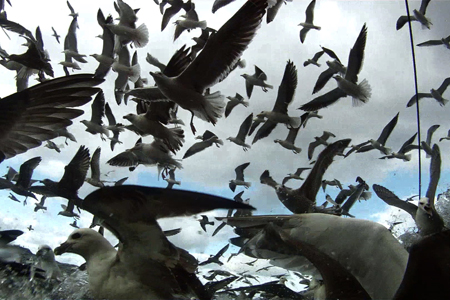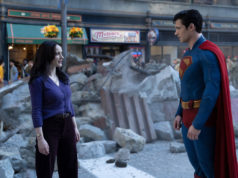The last day of the Lone Star Film Festival began with an extraordinary documentary called Leviathan. Directed by Lucien Castaing-Taylor and Véréna Paravel, this follows a New England commercial fishing vessel on the North Atlantic. The movie is an all-out assault on the senses, with a soundtrack filled with the loud clanking of machinery and the roar of the sea, and the screen filled with extreme close-ups of the gory business of fishing. And by “extreme close-ups,” I mean that the bodies of dead and dying fish are hitting the camera lens. It’s all presented without context, interviews, or background music. Some of the material here makes you think, “Whoa, how’d they get this shot?” The camera bobs up and down in the water as it catches a sky filled with sea birds as they dive for chum spilling off the boat. When one bird (sorry, my ornithology fails me here) alights on the deck of the ship to scavenge for fish heads, the camera gets close enough that you can actually count its feathers. Seeing the process is horrifying enough to turn some viewers vegetarian, but if you’re a conscientious meat-eater (and I like to think of myself as such), you shouldn’t shy away from the realities of what it takes to get that piece of meat to your plate. I hate the title of this movie; equating the Biblical monster of the deep with our man-made commercial fishing vessels is too easy and glib. Still, this is a unique piece of work, and it’s one documentary that needs to be seen on the big screen.
Uprising isn’t as overwhelming, but I found my share of drama when I took my seat at the theater and saw an apparently unattended bag next to my seat. I started to take the bag to the theater management, but then the guy sitting about 10 seats away (the only other occupant in the row) alerted me that that was his bag. I didn’t ask why he was sitting so far away from his bag, but it gave me some qualms to sit next to a mysterious bag during a politically charged documentary. Then again, I am still here. The film is rather dry, with a great deal of talking-heads treatment of its subject, the overthrow of Hosni Mubarak’s government last year. However, it contains the voices of the Egyptian people who were witnesses and participants in the revolution, including actor Amr Waked (recently see in Salmon Fishing in the Yemen). It also has video footage taken by the revolutionaries on their smartphones, which is surely how revolutions will be documented for the foreseeable future. This movie isn’t the best, but it’s the first of what’s sure to be many documentaries about the Arab Spring, so it scores points for getting there.
From there, the crowd-pleasing instincts of The Sapphires came as something of a relief. This Australian movie is about four Aboriginal girls in the late 1960s who entertain U.S. troops in Vietnam by singing Motown R&B songs. It touches on Australia’s history with the Stolen Generations, and it’s based on a stage play by Tony Briggs, who based that on his mother’s real-life expriences. The movie has its sentimental excesses, but they melt away when Jessica Mauboy lets her voice loose on songs like “Who’s Lovin’ You” and “What a Man.” There’s also a terrific performance by Bridesmaids’ Chris O’Dowd as the group’s Irish manager. Several of the cast members here were in the Australian musical Bran Nue Dae, which is on DVD in America under the title Brand New Day. I missed that movie when it came out a couple of years ago. I need to catch up with it.
The festival ended with Edward Burns’ The Fitzgerald Family Christmas, which shows a filmmaker who hasn’t progressed one jot since The Brothers McMullen. He portrays the eldest of seven kids who has to wrangle a thorny reunion between his mom (Anita Gillette) and his dad (Ed Lauter, who really looks like he could be Burns’ father) who walked out on the family 20 years ago and is now dying. Once again Burns takes up dating and big, dysfunctional New York Irish families as his subject, and while other artists return to the same themes and subjects and unearth new insights, Burns’ well ran dry back in the 1990s. He needs a new act.
All in all, this wasn’t nearly as strong a closing film as last year’s Pariah, but this year’s LSIFF showed me some fantastic new things and at least one movie (Silver Linings Playbook) that’s going on my Top 10 list at the end of the year. It was another strong year for the festival under its current management. I’m looking forward to next year.












